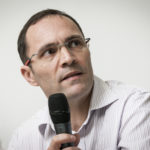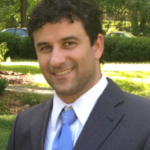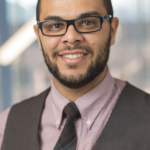Keynote Presenters:
 Hugh Herr, Ph.D., Associate Professor, Media Arts and Sciences, MIT Media Lab
Hugh Herr, Ph.D., Associate Professor, Media Arts and Sciences, MIT Media Lab
Hugh Herr’s research program seeks to advance technologies that promise to accelerate the merging of body and machine, including device architectures that resemble the body’s musculoskeletal design, actuator technologies that behave like muscle, and control methodologies that exploit principles of biological movement. His methods encompass a diverse set of scientific and technological disciplines, from the science of biomechanics and biological movement control to the design of biomedical devices for the treatment of human physical disability. His research accomplishments in science and technology have already made a significant impact on physically challenged people. The Transfemoral Quasipassive Knee Prosthesis has been commercialized by Össur Inc., and is now benefiting amputees throughout the world. In 2006, he founded the company iWalk Inc. to commercialize the Powered Ankle-Foot Prosthesis and other bionic leg devices. He has given numerous invited and plenary lectures at international conferences and colloquia, including the IVth World Congress of Biomechanics, the International Conference on Advanced Prosthetics, the National Assembly of Physical Medicine and Rehabilitation, World Economic Forum, Google Zeitgeist, Digital Life Design, and the TEDMED Conference. He is Associate Editor for the Journal of NeuroEngineering and Rehabilitation, and has served as a reviewer for the Journal of Experimental Biology, the International Journal of Robotics Research, IEEE Transactions on Biomedical Engineering, and the Proceedings of the Royal Society: Biological Sciences. He has been invited to participate in joint funding proposals from other universities and corporations, and has served on research review panels including the National Institute of Health, the National Institute on Disability and Rehabilitation, and the Department of Veterans Affairs. In 2007, He was presented with the 13th Annual Heinz Award for Technology, the Economy and Employment. His work has been featured by various national and international media, including Scientific American Frontiers, Technology Review, National Geographic, the History Channel, and CNN.
 Robert Riener, Ph.D., Professor, Sensory-Motor Systems Lab, ETH Zurich
Robert Riener, Ph.D., Professor, Sensory-Motor Systems Lab, ETH Zurich
Robert Riener is Full Professor for Sensory-Motor Systems at the Department of Health Sciences and Technology, ETH Zurich. He holds a Double-Professorship with the University of Zurich and is also active in the Spinal Cord Injury Center of the Balgrist University Hospital (Medical Faculty of the University of Zurich). Robert studied mechanical engineering at TU München and the University of Maryland (USA). He obtained his doctoral degree from the TU München in 1997. Since he began working in Zurich, he has developed robots and interaction methods for motor learning in rehabilitation and sports. His current research interests involve human motion synthesis, exoskeletons and other wearable robotics, biomechanics, virtual reality, man-machine interaction and rehabilitation robotics, along with being the founder and head of the Cybathlon. He authored and co-authored more than 400 peer-reviewed journal and conference articles and 20 patents. He is a member of several scientific societies (e.g., IEEE/EMBS, DGBMT/VDE, IFESS) and an associate editor of several scientific journals. For his development of the arm therapy robot ARMin, he was awarded with several prizes including the humanTech Innovation Prize and the Swiss Technology Award. He was awarded also with the IEEE TNSRE Best Paper Award 2010 and the euRobotics Technology Transfer Awards 2011 and 2012.
Breakout Session Speakers
 H. Harry Asada, Ford Professor, Massachusetts Institute of Technology (MIT)
H. Harry Asada, Ford Professor, Massachusetts Institute of Technology (MIT)
H. Harry Asada is an educator, scholar, and entrepreneur. He is Ford Professor of Mechanical Engineering and Director of the Brit and Alex d’Arbeloff Laboratory for Information Systems and Technology in the Department of Mechanical Engineering, Massachusetts Institute of Technology (MIT), Cambridge, MA. As an educator, he teaches robotics, system dynamics and control. He has supervised 50 doctoral students and over 100 master students in his laboratory. He wrote the first textbook on robotics, and contributed to establishing the field of robotics. As a researcher he specializes in robotics, biological engineering, and system dynamics and control. His current robotics research focuses on wearable robots, bio-integrated robots, and robot applications to aircraft manufacturing and biomedical and rehabilitation systems. He has established six start-up companies in the areas of sensor networks, robot controllers, wearable robots, and rehabilitation devices. He also established an incubation center for supporting young engineers in reducing novel technology to commercial products. Dr. Asada has received numerous awards for his work and has published several papers. He is a Fellow of ASME. He received BS, MS, and Ph.D degrees in Mechanical and Precision Engineering, all from Kyoto University, Japan.
 Marisol Barrero, Project Manager, Ergonomics, Toyota Motor North America
Marisol Barrero, Project Manager, Ergonomics, Toyota Motor North America
Marisol Barrero has worked for Toyota Motor North America (Georgetown, KY) in the Production Engineering Division’s Safety Group since December 2006. Currently she manages the North American manufacturing ergonomics program. She develops and supports tools, standards, and procedures for use across Toyota’s 15 North American manufacturing facilities. She leads ergonomics development for new vehicles produced in North America. Her most recent role has been to lead the implementation of safety-related wearable devices across Toyota. She currently serves as Co-Chair of the Automotive Exoskeleton Group (AExG), sponsored via the Wearable Robotics Association. Prior to joining Toyota, Marisol worked as an ergonomics consultant with Mitsui Sumitomo Insurance Group and Humantech, as well as a researcher with the National Institute for Occupational Safety & Health (NIOSH). She received her B.A. and M.S. from Cornell University in Ithaca, NY. She has been a Certified Professional Ergonomist since 2006.
 Terry Butler, CSP, President, Lean Steps Consulting Inc.
Terry Butler, CSP, President, Lean Steps Consulting Inc.
Terry is a Certified Safety Professional and holds degrees in Safety Engineering and Industrial Technology, along with an Associate Arts degree in Business and Industrial Psychology. He has 34 years’ experience in manufacturing and is President of Lean Steps Consulting Inc. Working with Iowa State University, John Deere, Vermeer and Toyota, Terry has been focusing his time over the last three and a half years documenting upper body exoskeleton performance, care, limitations and use to protect workers. He has authored sev
 Kristin Davenport, Of Counsel at Covington & Burling LLP
Kristin Davenport, Of Counsel at Covington & Burling LLP
Kristin Davenport advises medical device companies regarding premarket strategies and pathways, the premarket submission process, advertising and promotion, compliance and enforcement matters, and import/export issues. She has extensive experience with 510(k) premarket notifications, de novo petitions, premarket approval applications, investigational device exemptions, device modifications, 513(g) Requests for Information, MDR reporting, device recalls, and Part 806 reports. Kristin regularly prepares 513(g) Requests for Information to obtain FDA’s views regarding the classification and applicable regulatory requirements for novel devices, such as mobile medical applications. She develops successful premarket strategies for clients, and frequently participates in pre-submission meetings with CDRH. Kristin navigates issues that arise during the premarket review process and has successfully represented device companies in administrative appeals. She also assists and represents clients in compliance and enforcement proceedings, including responding to FDA Form 483s and Warning Letters. She advises on jurisdictional questions and assists clients with combination product issues, including submitting Requests for Designation to the Office of Combination Products.
Bruce Floersheim, P.E., Ph.D., COO, GoX Studio
Dr. Floersheim has over 25 years of experience successfully leading and managing organizations of increasing complexity and responsibility as an officer in the United States Army and a small business founder/executive. Dr. Floersheim successfully started and has grown a federal government services company from the original two founders to $210M contract awards and 45 employees in the third full year of operations, running the company as CEO. He is currently the COO of GoX Studio, a product development company focused on wearable and robotic technologies that enhance health, performance, and quality of life. He is also a co-founder and Director of Operations for the Wearable Robotics Association (WearRA). Dr. Floersheim obtained his Ph.D. in Mechanical Engineering in 2008 from Old Dominion University, his M.S. in Mechanical Engineering from Stanford University, and graduated from the United States Military Academy in West Point.
 Gail Forrest, Associate Director, Kessler Foundation
Gail Forrest, Associate Director, Kessler Foundation
Gail F. Forrest, Ph.D. is Associate Director of Human Performance and Engineering Research at Kessler Foundation. She is also an Assistant Professor, Department of Physical Medicine and Rehabilitation at Rutgers – New Jersey Medical School. As a postdoctoral fellow at Kessler Foundation Research Center in 2002, Dr. Forrest was awarded grant funding by the New Jersey Commission on Spinal Cord Injury (SCI) Research to investigate locomotor training (LT) using body weight support with manual assistance for individuals after Incomplete SCI. She has presented and published extensively in the area of neuroplasticity and musculoskeletal changes for individuals after SCI. Dr. Forrest has other key interests in the area of biomechanics as related to modeling algorithms for understanding control mechanisms in upper extremity (i.e. arm reaching after stroke), and postural control during locomotion. Currently, she is combining exoskeletal-assisted walking with external electrical stimulation of the spinal cord toward potentially promoting voluntary muscle firing and independent walking.
 Jason Gillette, Ph.D., Associate Professor, Iowa State University
Jason Gillette, Ph.D., Associate Professor, Iowa State University
Jason Gillette earned a Ph.D. in Biomedical Engineering/Engineering Mechanics from Iowa State University. He is an Associate Professor and the Director of Graduate Education with the Department of Kinesiology at Iowa State University. He utilizes video, force, and EMG measurements to analyze athletic movements, industrial job tasks, and activities of daily living. One of his projects involves assessing a passive shoulder support exoskeleton in industrial manufacturing settings using EMG to quantify effects on muscle activation and fatigue.
 Yonnel Giovanelli, Manager of Ergonomic and Organizational and Human Factors, Rolling Stock SNCF
Yonnel Giovanelli, Manager of Ergonomic and Organizational and Human Factors, Rolling Stock SNCF
Yonnel Giovanelli is the manager of ergonomic and organizational and human factors division at Rolling Stock SNCF. He is a scientific and technical expert of SYNAPSES network SNCF, and AFNOR expert in standard commission X 35 A ‘Ergonomy.’ Yonnel earned a degree in sciences and technics of physical and sports activities, job world option (Sports and management), and a master degree in ergonomy (Paris 1 Panthéon la Sorbonne). After a career with a consulting firm in Lorraine as a consultant trainer from 1994 to 2005, he joined SNCF in 2005 as senior ergonomist in a safety multi-agency. Currently he is in charge of the rolling stock maintenance about ergonomy, Risk Prevention of Physical Activities, hardness, HOF and NTPA.
 Joseph K. Hitt, Ph.D., Executive Director, Wearable Robotics Association
Joseph K. Hitt, Ph.D., Executive Director, Wearable Robotics Association
Dr. Hitt is recognized nationally as an expert in wearable robotic technologies and human systems. He participates on multiple government, private and academic panels and boards such as the Board on Army Science and Technology, the Army Basic Science Review Panel, and Wearable Robotics International Workshop. He has been invited to be the plenary speaker at numerous conferences such as those held by the National Robotics Initiative, the National Defense Industrial Association, Association of Unmanned Vehicle Systems International, the Harvard University Smart Clothes Symposium, and ExxonMobil Wearable Technology Workshop. After serving as the director for both the Aerospace Systems and Thermodynamics Group and the Mechanical Engineering Research Center at the United States Military Academy, Dr. Hitt was invited to become a Program Manager at the Defense Advanced Research Project Agency (DARPA). While at DARPA, Dr. Hitt led multiple advanced technology programs in partnership with 15 industry prime contractors, 10 subcontractors, and 10 world-class academic institutions and managed a robotics-centric program portfolio worth over $300 Million. Dr. Hitt currently serves as the CEO of GO XTUDIO, LLC, a product development company focused on wearable and robotic technologies that enhance health, performance, and quality of life. Dr. Hitt obtained his Ph.D. in Mechanical Engineering from Arizona State University and his B.S. in Aerospace, Aeronautical and Astronautical Engineering from the University of Southern California.
 He (Helen) Huang, Professor, NCSU and UNC
He (Helen) Huang, Professor, NCSU and UNC
Dr. He (Helen) Huang is a Professor in the Joint Department of Biomedical Engineering at North Carolina State University (NCSU) and the University of North Carolina at Chapel Hill (UNC), Director of the Closed-Loop Engineering for Advanced Rehabilitation (CLEAR) core, the University Faculty Scholar at NCSU, and adjunct Professor at the UNC Department of Physical Medicine and Rehabilitation and NC State Electrical and Computer Engineering. Her research interest lies in neural-machine interfaces for artificial limbs and exoskeletons, wearer-robot interaction, adaptive and optimal control of wearable robots, and human movement control. Her research has been sponsored by federal agencies (such as NIH, NSF, DOD, DARPA, and NIDILRR) and private companies (such as Össur and BionX). She was a recipient of the Delsys Prize for Innovation in Electromyography, the Mary E. Switzer Fellowship with the National Institute on Disability, Independent Living, and Rehabilitation Research (NIDILRR), and a NSF CAREER Award; she was named NC State faculty scholar in 2015. Dr. Huang currently serves as an Associate Editor for the Journal of Neuroengineering and Rehabilitation and IEEE Transactions on Neural System and Rehabilitation. She is also a member for the Delsys Prize Review Board and the Programmatic Panel for DOD Orthotics and Prosthetics Outcomes program. She is a senior member of IEEE and a member of the Society for Neuroscience and Biomedical Engineering Society.
 Arun Jayaraman, P.T., Ph.D., WearRA and the Shirley Ryan Ability Lab
Arun Jayaraman, P.T., Ph.D., WearRA and the Shirley Ryan Ability Lab
Dr. Jayaraman is the Director of the Max Näder Center for Rehabilitation Technologies & Outcomes Research and a research scientist at the Rehabilitation Institute of Chicago / Shirley Ryan Ability Lab. He is also an Associate Professor in the Departments of Physical Medicine & Rehabilitation, Physical Therapy & Human Movement Sciences, and Medical Social Sciences at Northwestern University, Chicago, IL. In addition, Dr. Jayaraman serves as the Director of Global Outreach for the Wearable Robotics Association (WearRA). His research interests focus on developing and executing both industry-sponsored and investigator-initiated research in rehab robotics, prosthetics, orthotics, and other assistive and adaptive technologies to treat physical disability. He specifically focuses on using quantitative outcome measures (example wearable sensors, smart phones, biomarkers etc.) to improve the real-world use of rehabilitation technology. Dr. Jayaraman’s work is currently funded by NIH, DOD, NIDILRR, NSF, Industry, and private foundations. He earned his Ph.D. in Rehabilitation Medicine from the University of Florida, Gainesville, FL and his M.S. in Physical Therapy from Georgia State University, Atlanta, GA.
 Zen KOH, Managing Director, Fourier Intelligence
Zen KOH, Managing Director, Fourier Intelligence
Zen KOH is the Managing Director for Fourier Intelligence’s International Hub in Singapore; Deputy CEO and CSO for Fourier Intelligence’s Headquarter in Shanghai. Fourier Intelligence is a technology company providing exoskeleton robotics product and service for rehabilitation. Zen has extensive experience in providing leadership and management for organizations that provide medical devices, healthcare solutions, and services for people with disabilities, and consults regularly with executives from a variety of fields to help create synergistic solutions. In June 2012, Zen was nominated by MD+DI amongst the 40 under 40, future most influential industry leaders in medtech, who are developing novel technologies and leading companies that will transform future healthcare system.
 Kyoungchul Kong, KAIST / Angel Robotics (Korea)
Kyoungchul Kong, KAIST / Angel Robotics (Korea)
Kyoungchul Kong is a founder of ANGEL ROBOTICS (formerly SG Robotics) and is currently the CEO of the company. He is also an associate professor at the Department of Mechanical Engineering, Korea Advanced Institute of Science and Technology (KAIST), Daejeon, South Korea. He has authored or coauthored more than 150 technical articles in journals and conference proceedings in the area of mechatronics, including locomotive robotics and human robot interactive systems. His current research interests include design, modeling, and control of mechatronic systems with emphasis on locomotion and mobility of robotic systems. Dr. Kong received the Best Innovation Award from the President of South Korea in 2017, the Commendation by the Minister of Commerce, Industry and Energy in 2017, the Bronze Medal of Cybathlon 2016, the Young Researcher Award of IFAC Mechatronics TC in 2016, and many others. He received the B.Eng. degree in mechanical engineering (summa cum laude) and the B.S. degree in physics, both in 2004, and the M.S. degree in mechanical engineering in 2006, all from Sogang University, Seoul, South Korea, and the Ph.D. degree in mechanical engineering from the University of California, Berkeley, CA, USA, in 2009.
 Tommaso Lenzi, Ph.D., Assistant Professor, Mechanical Engineering, University of Utah
Tommaso Lenzi, Ph.D., Assistant Professor, Mechanical Engineering, University of Utah
Tommaso Lenzi is an Assistant Professor in the Department of Mechanical Engineering at University of Utah, and a Core Faculty in the Utah Robotics Center. Previously, he was a Research Scientist at the Rehabilitation Institute of Chicago and a Postdoctoral Fellow at Northwestern University. He is a member of IEEE, the Robotics and Automation Society (RAS), and the Engineering in Medicine and Biology Society (EMBS). Dr. Lenzi has co-authored more than 50 peer-reviewed scientific publications and nine patent applications and disclosures. He serves as Associate Editor for the IEEE International Conferences on Rehabilitation Robotics (ICORR) and Biomedical Robotics and Biomechatronics (BIOROB). Dr. Lenzi directs the Bionic Engineering Lab, which conducts research at the intersections of robotics, mechatronics, and rehabilitation medicine with a major emphasis on the design and control of wearable robots for human assistance and rehabilitation. He received the MS degree in Biomedical Engineering from the University of Pisa in 2008, and the PhD degree in BioRobotics from Scuola Superiore Sant’Anna in 2012.
 Zachary Lerner, Assistant Professor, Northern Arizona University
Zachary Lerner, Assistant Professor, Northern Arizona University
Zachary Lerner is an Assistant Professor in Mechanical Engineering at Northern Arizona University. He received the Ph.D. degree in Biomedical Engineering from Colorado State University in 2015 before completing a postdoctoral fellowship at the National Institutes of Health in 2016. His research seeks to improve mobility and neuromuscular function in individuals with disabilities through advancement in the design, control, and implementation of robotic exoskeletons. For more information please visit www.nau.edu/biomech
 Matthew Marino, Lead Ergonomist, Briotix
Matthew Marino, Lead Ergonomist, Briotix
Matthew Marino is a Lead Ergonomist with Briotix, located in Portland, OR. Briotix is the leading provider of workforce performance solutions, combining ergonomic, injury-prevention, physical rehabilitation and performance optimization services. In his role, Matt works with some of the world’s largest companies to develop human-centered organizations and unlock the full potential of the global workforce. His background and training have given him the tools to develop results driven programs for a global clientele. Matt is a Physical Therapist, Certified Professional Ergonomist, Certified Workers Compensation Healthcare Provider, Certified Strength and Conditioning Specialist, Tactical Strength and Conditioning Facilitator, Certified Personal Trainer, Six Sigma black belt who is trained in the Functional Movement Screen, Selective Functional Movement Assessment and Y Balance Test.
 Karen Nolan, Ph.D., Senior Research Scientist, Human Performance and Engineering, Kessler Foundation
Karen Nolan, Ph.D., Senior Research Scientist, Human Performance and Engineering, Kessler Foundation
Karen Nolan is a Senior Research Scientist in the Human Performance and Engineering at the Kessler Foundation (KF), Associate Professor of PM&R at Rutgers NJMS, Clinical Research Scientist at Children’s Specialized Hospital, and Affiliated Faculty of Biomedical Engineering at the New Jersey Institute of Technology. Dr. Nolan has extensive experience in leading the design and implementation of biomechanical research and strong expertise in balance, gait, movement analysis, neuromuscular physiology, rehabilitation robotics, and peripheral motor control. She completed the NIDRR-funded ARRT postdoctoral research fellowship in Biomechanics and Outcomes Research at KF/UMDNJ (now Rutgers) NJMS. Dr. Nolan was awarded a NIDRR Mary E. Switzer Merit Fellowship Grant to conduct research on the effect of stroke and orthotic interventions on gait. She is recognized as a leader in the field of biomechanics and motor rehabilitation and has been invited to give presentations on these topics at national and international conferences. Dr. Nolan serves as a grant reviewer for NIH, NIDILRR, VA, and is an ad-hoc reviewer for Archives of Physical Medicine Rehabilitation, Journal of Biomechanics, Prosthetics and Orthotics International, NeuroRehabilitation, Topics in Stroke Rehabilitation, and Journal of Applied Biomechanics and is a member of the American Congress of Rehabilitation Medicine, International Society of Biomechanics, and Gait and Clinical
 James Patton, Professor, Bioengineering, University of Illinois at Chicago
James Patton, Professor, Bioengineering, University of Illinois at Chicago
James L. Patton is a Professor of Bioengineering at the University of Illinois at Chicago, and a senior research scientist at the Shirley Ryan AbilityLab. He worked in automotive manufacturing and in nuclear medicine before discovering the control of human movement. His general interests involve robotic teaching, dynamic balance control, haptics, modeling of the human-machine interface, and robot-facilitated recovery from a brain injury. Patton is vice president of IEEE-EMB society, and editor in chief of the Proceedings of the Engineering in Medicine and Biology. He earned BS degrees in mechanical engineering and engineering science from the University of Michigan in 1989, MS degree in theoretical mechanics from Michigan State, in 1993, and the PhD degree in biomedical engineering from Northwestern University in 1998.
 Frank Pochiro, Senior Engineer, BMW Manufacturing
Frank Pochiro, Senior Engineer, BMW Manufacturing
Frank Pochiro is a Senior Engineer at BMW in the Process Planning Department responsible for Tooling, Fixtures, Equipment, and processes for BMWs built at the Spartanburg Facility in Upstate South Carolina. As part of a current initiatives to coordinate projects focusing on innovations for manufacturing and assembly, he collaborated with two wearable robotics suppliers to be the first in the world to use exoskeletons in the automotive manufacturing industry. BMW’s experience with exoskeletons has been highlighted in several major publications and German Television. Prior to BMW, Frank spent more than 20 years in the automotive industry. He has held multiple contract or direct engineering and management positions in quality, design, and manufacturing. He worked at Dimensional Control Systems, EDAG, Opel, DaimlerChrysler, and Robert Bosch Corporation.
 Elliott Rouse, Assistant Professor, University of Michigan
Elliott Rouse, Assistant Professor, University of Michigan
Prof. Elliott Rouse is an Assistant Professor in the Department of Mechanical Engineering and a Core Faculty Member in the Robotics Institute at the University of Michigan. He directs the Neurobionics Lab, whose vision is to discover the fundamental science that underlies human joint dynamics during locomotion and incorporate these discoveries in a new class of wearable robotic technologies. He is a member of the IEEE EMBS Technical Committee on Biorobotics, and is on the Editorial Board of IEEE Robotics and Automation Letters, as well as RESNA’s Assistive Technology journal. Elliott received the BS degree in mechanical engineering from The Ohio State University in 2007, and the MS and PhD degrees in biomedical engineering from Northwestern University in 2009 and 2012, respectively. Subsequently, he joined the Massachusetts Institute of Technology as a Postdoctoral Fellow, working with the Biomechatronics Group in the MIT Media Lab. Prior to joining the University of Michigan, Elliott was faculty in the Schools of Medicine and Engineering at Northwestern University, and a Research Scientist at the Shirley Ryan AbilityLab (formerly the RIC). Elliott and his research have been featured at TED, on the Discovery Channel, CNN, National Public Radio, Wired Magazine UK, and Business Insider.
 Charlie Sidoti, Co-Founder, Insurance Discourse
Charlie Sidoti, Co-Founder, Insurance Discourse
Charlie Sidoti has 25+ years in property and casualty insurance and seven years running an insurtech company focused on risk assessment process optimization. Charlie’s roles have included underwriting and risk management across multiple hazard areas, most often with emphasis on commercial insurance risk modeling. Charlie has worked for St. Paul Companies (now Travelers Insurance) and OneBeacon Insurance Group.
 Thomas Sugar, P.E., Ph.D., WearRA and Arizona State University
Thomas Sugar, P.E., Ph.D., WearRA and Arizona State University
Dr. Thomas Sugar works in the areas of wearable robotics for rehabilitation and gait assistance. In industry, he worked as a project engineer for W. L. Gore and Associates earning a Professional Engineering License. He is a faculty member in the Department of Mechanical and Aerospace Engineering and the Department of Engineering at Arizona State University. He majored in business and mechanical engineering for his Bachelor’s degrees and mechanical engineering for his Doctoral degree, all from the University of Pennsylvania. Dr. Sugar leads a research effort in wearable robotic systems. He is developing robotic orthoses and prostheses for rehabilitation and enhanced mobility. His current research projects include SPARKy, Spring Ankle with Regenerative Kinetics, a powered prosthetic ankle, PAFO, a powered ankle foot orthosis, and wearable exoskeletons for enhanced gait performance. Dr. Sugar also co-founded two companies: SpringActive, Inc. and the Wearable Robotics Association (WearRA).
 Ana Luisa Trejos, Assistant Professor, Western University
Ana Luisa Trejos, Assistant Professor, Western University
Dr. Ana Luisa Trejos is an Assistant Professor in the Department of Electrical and Computer Engineering and the School of Biomedical Engineering at Western University, an active member of Western’s Bone and Joint Institute Operations and Seminars Committees, and an Associate Scientist at the Lawson Health Research Institute, in London, Ontario, Canada. She has expertise in the design, integration, and evaluation of mechatronic devices and systems for surgery, therapy, and rehabilitation. This experience led her to establish the Wearable Biomechatronics Laboratory in 2013, dedicated to the design of smart wearable devices for rehabilitation and musculoskeletal health. She also serves as an associate editor for the Journal of Rehabilitation and Assistive Technologies Engineering.
 Nicola Vitiello, Associate Professor, Scuola Superiore Sant’Anna
Nicola Vitiello, Associate Professor, Scuola Superiore Sant’Anna
Nicola Vitiello is an Associate Professor with The BioRobotics Institute (Scuola Superiore Sant’Anna, SSSA, Pisa, Italy) where he leads the Wearable Robotics Laboratory. He is co-author of more than 60 ISI/Scopus papers and co-inventor of more than 15 patent applications. He served as the Scientific Secretary of the EU FP7 CA-RoboCom project, and he was the scientific project coordinator of the EU FP7 CYBERLEGs project. Currently he is the scientific project coordinator of the H2020-ICT- CYBERLEGs Plus Plus project, the national project MOTU funded by INAIL, and is partner of the H2020-ICT- AIDE and H2020-FoF- HUMAN projects. In 2015, he co-founded IUVO Srl, a spin-off company of SSSA.
 Karl Zelik, Assistant Professor, Vanderbilt University
Karl Zelik, Assistant Professor, Vanderbilt University
Dr. Karl Zelik co-directs the Center for Rehabilitation Engineering & Assistive Technology (CREATE) at Vanderbilt University. CREATE aims to improve health, mobility and independence for individuals with disabilities, and to enhance human capabilities beyond biological limits, by engineering, measuring, optimizing and understanding technologies that physically augment human performance. Dr. Zelik’s research team employs experimental and computational methods to study human biomechanics (the science of movement) and how biomechanical principles can translate into improvements in assistive devices (prostheses, exoskeletons, smart clothing). Dr. Zelik received his B.S. and M.S. in Biomedical Engineering from Washington University in St. Louis, then his Ph.D. in Mechanical Engineering from the University of Michigan. Following this, he was a post-doctoral researcher and Whitaker International Scholar at the Santa Lucia Foundation Rehabilitation Hospital in Rome, Italy. He joined the Mechanical Engineering faculty at Vanderbilt University in 2014 and holds secondary appointments in the departments of Biomedical Engineering and Physical Medicine & Rehabilitation.
